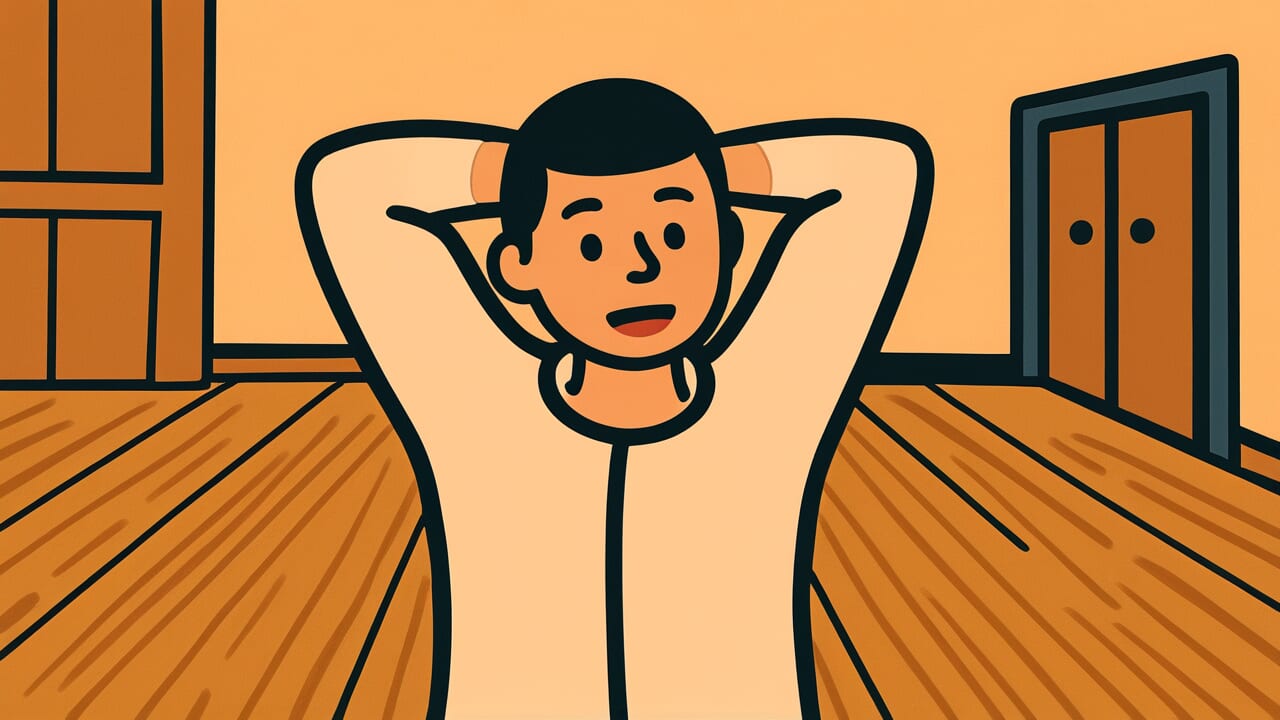How to Read “Wearing wooden clogs and head over heels”
Ashida wo haite kubittake
Meaning of “Wearing wooden clogs and head over heels”
“Wearing wooden clogs and head over heels” is a proverb that describes someone so absorbed in love that they stop caring about their appearance or what others think.
Normally, you wear wooden clogs to look presentable. But being submerged up to your neck despite wearing them shows the contradiction of someone lost in love.
This proverb captures how people in love lose their reason. They forget about appearances and dignity that they would normally care about.
People use this saying when someone is so focused on romance that they can’t see anything else. The tone is slightly teasing but also warm and understanding.
Today, this expression works beyond just romance. It describes anyone who gets so passionate about something that they forget to consider those around them.
This proverb shows a very human truth. When passion takes over, rational judgment fades away.
Origin and Etymology
No clear historical records explain where this proverb came from. However, we can learn a lot by looking at the words themselves.
“Ashida” refers to wooden clogs with raised platforms. People wore them on rainy days or muddy roads to keep their kimono hems clean.
During the Edo period, these clogs were common everyday footwear for ordinary people.
“Kubittake” means being submerged up to your neck in something. Just as you can’t move when water reaches your neck, this word describes being so deep in love that you lose control.
The combination of these two words creates an interesting contradiction. You wear clogs to maintain dignity, yet you still end up submerged to your neck.
This shows how love makes people lose sight of everything. Even when you try to look proper, passion overwhelms you anyway.
The people of Edo cleverly expressed this human comedy and tenderness through words.
This proverb connects a concrete everyday object with the abstract emotion of passionate love. This combination shows the beauty of Japanese expression.
Usage Examples
- Ever since he got a new girlfriend, he’s been wearing wooden clogs and head over heels, spacing out even at work
- Those two are wearing wooden clogs and head over heels, so nothing we say will get through to them
Universal Wisdom
“Wearing wooden clogs and head over heels” has been passed down through generations because it captures both sides of human passion perfectly.
Falling in love makes people blind. They forget about appearances, what others think, and sometimes even their own interests.
From a rational perspective, this might seem foolish. But aren’t these moments of losing ourselves what make us truly human?
This proverb contains a warm view of human nature. The comical image of being submerged despite wearing clogs shows empathy rather than criticism.
Everyone has experienced or wants to experience these moments of passion beyond reason. Our ancestors didn’t reject this. They accepted it as part of life’s richness.
Times change, but the essence of losing yourself in something stays the same. This applies not just to romance but to work passion, creative absorption, and all human endeavors.
Being perfectly rational isn’t everything. Sometimes having passion so strong that you can’t see around you matters more.
This proverb teaches us that human life shines brightest in these moments.
When AI Hears This
Wearing wooden clogs raises your center of gravity more than 10 centimeters above the ground. In physics, the higher the center of gravity, the easier it is to fall.
This follows the same principle as a pendulum. The longer the distance from the pivot point to the center of gravity, the greater the rotational moment from even a slight tilt.
What’s interesting is that the human posture control system faces the same instability. Our brains constantly send fine-tuning commands to our muscles to maintain balance.
But when you wear wooden clogs, the range this control system can handle shrinks dramatically. In control engineering, this is called “a state where restoring force can’t keep up with disturbance.”
The system is one step away from going out of control.
Being absorbed in love has the same structure. The control system of reason can’t keep up with the disturbance of emotion.
You step outside the stable range of judgment. The physical center of gravity raised by clogs and the emotional center raised by love both cause “height” to “break through control limits.”
The people of Edo intuitively understood that these two unstable systems were mathematically similar. They did this without experimental equipment or equations.
Using physical laws felt through the body as metaphors for mental states shows excellent system understanding that humans had long before science proved it.
Lessons for Today
This proverb teaches you the importance of having passion and the difficulty of maintaining balance at the same time.
Modern society often demands that you stay calm and rational. There’s a tendency to think that living calculatingly without being swayed by emotions is smart.
But this proverb shows a different truth. Life needs moments when you’re so absorbed in something that you can’t see around you.
Of course, you can’t function if you constantly lose yourself. But a life where you’ve never been “head over heels” might feel somewhat faded.
Whether in romance, work, or hobbies, having something you can be passionate about enriches your life.
What matters is not being afraid to have passion. If you only worry about how others see you and whether you look proper, you’ll lose sight of what truly matters.
Sometimes have the courage to take off your wooden clogs and get submerged up to your neck. These experiences make you deeper and more attractive as a person.



Comments